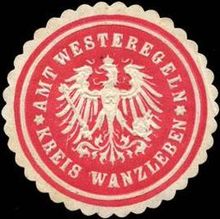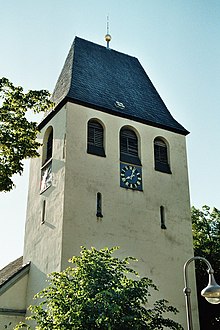Western rules
|
Western rules
Börde-Hakel municipality
|
|
|---|---|
| Coordinates: 51 ° 57 ′ 43 " N , 11 ° 23 ′ 21" E | |
| Height : | 70 m above sea level NN |
| Area : | 13.94 km² |
| Residents : | 1957 (Dec. 31, 2008) |
| Population density : | 140 inhabitants / km² |
| Incorporation : | January 1, 2010 |
| Postal code : | 39448 |
| Area code : | 039268 |

Westeregeln is a district of the municipality of Börde-Hakel and is located on the north-western edge of the Salzlandkreis in Saxony-Anhalt .
The place is in the valley of the Bode , about halfway between Magdeburg and Halberstadt .
history
The place was first mentioned in a document in 941 in a deed of donation from the East Franconian King Otto I. 946 was mentioned again in the deed of foundation of the Gernrode Westeregeln monastery . At that time it was a village with 200 to 300 inhabitants. Westeregeln was owned by the monastery until 1227, after which it belonged to the Archdiocese of Magdeburg . The church tower was built around 1200. It is a late Romanesque west clump tower and typical of the church tower structures of that time in the Magdeburg Börde . In 1370 a knight Hans is named as the owner of the Westeregeln estate. In 1680 Westeregeln became part of Brandenburg . The manor was sold to the cathedral chapter of Magdeburg in 1705 for 68,000 Reichstaler and fell to the Prussian state in 1810. Prussia operated the estate as the domain of Westeregeln. The domain consisted of 1,849 acre farm, 98 acres of meadows, 279 Morning Anger and 5.5 acres of gardens, a sheep farm, a brewery and a distillery.
In 1547 the Cistercian nunnery "Our dear mother" is mentioned for the first time in Westeregeln. After the abolition of the monastery, the monastery property was continued as a secular farm until 1945.
In 1553 the Reformation was introduced in Western Rules. During the Thirty Years War , Westeregeln was plundered several times from 1625 onwards. In 1661 a peasant revolt took place in Westeregeln, during which the Assenburger Hof was burned down and the church was also damaged. An inscription on the church indicates that the church was repaired in 1662.
In 1781, 1785 and 1837 large fires destroyed large parts of the town. In 1757/58 in the Seven Years' War and in 1806 Westereglen was occupied by French troops. While the French refrained from pillaging in 1758 in return for a payment of 3357 thalers, the village was plundered for three days in 1806.
In 1834 lignite mining began on a site behind the old cemetery. By 1860, four more lignite opencast mines and a civil engineering were built.
A few kilometers west of the community, Hugo Sholto discovered Oskar Georg von Douglas under a gypsum store of potash and secured the mining rights and began mining carnallite in 1875 . He founded the "Potash and Rock Salt Mine Douglashall". In 1881 the stock corporation “Consolidierte Alkaliwerke” was combined with existing potash factories to form “Consolidierte Alkaliwerke Westeregeln AG”. The potash plant in Westeregeln was one of the largest of its kind in the world at the end of the 19th century. In 1922, the Consolidierte Alkaliwerke merged with other companies to form the "Salzdetfurth-Aschersleben-Westeregeln plant group". 1926 was a further consolidation of the so-called "Kaliblock" the later K + S . In 1939 the Consolidierte Alkaliwerke were sold to Deutsche-Solvay-Werke (DSW) , a subsidiary of the Belgian Solvay Group.
In 1881 Westeregeln was connected to the rail network. The Staßfurt – Blumenberg railway line runs via Westeregeln. The Westeregeln stop was opened in 1902.
Industrialization had resulted in high population growth. The 1,000 inhabitants in 1831 had grown to 4,000 by 1931. The Catholic Church was consecrated in 1933.
Towards the end of the Second World War there was a subcamp of the Buchenwald concentration camp in the north-west of the town in the potash mine III / IV for 560 prisoners who were used for forced labor . The two Poles who were buried in the local cemetery and who were victims of forced labor, known by name , probably belonged to this external command.
In 1945 the land reform was carried out in the Soviet occupation zone . The large farms were expropriated and 119 new farmer jobs were created. The new farmers should only be able to use their land for a short time. In 1953 the first LPG was founded in Westeregeln, in 1960 all independent farmers were forced into the LPG. The companies in Westeregeln were also nationalized in the GDR . The lignite mining became the VEB as an open-cast lignite mine . The plastics industry became VEB Orbitaplast in 1970 . Deutsche Solvay-Werke AG was not converted into a VEB because it was owned abroad. Nevertheless, they were subordinated to the HV Heavy Chemicals and managed according to planned economy principles.
On January 1st, 2010 the communities Westeregeln, Etgersleben and Hakeborn merged to form the new community Börde-Hakel.
politics
mayor
The last mayor of Westeregeln was Eckart Christel.
coat of arms
The coat of arms was awarded on April 5, 1938 by the Upper President of the Province of Saxony.
Blazon : “Quartered; Field 1: divided by red and silver three times to the left; Field 2: silver mountain hammers crossed in black; Field 3: a silver ploughshare in black; Field 4: divided by silver and red three times to the left. "
The old seal showed three plowshares over the crossed mountain hammers, the whole thing surrounded by ears of corn. Potash mining and agriculture are the residents' sources of income. The shield, divided diagonally by red and silver, is the coat of arms of the von Westeregeln family, which died out around 1650.
The coat of arms was designed by the Magdeburg State Archives Councilor Otto Korn .
The former municipality flies a flag. The flag shows the colors red - silver (white) with an applied coat of arms.
Individual evidence
Web links
swell
- 1050 years of western rules - 941–1991


